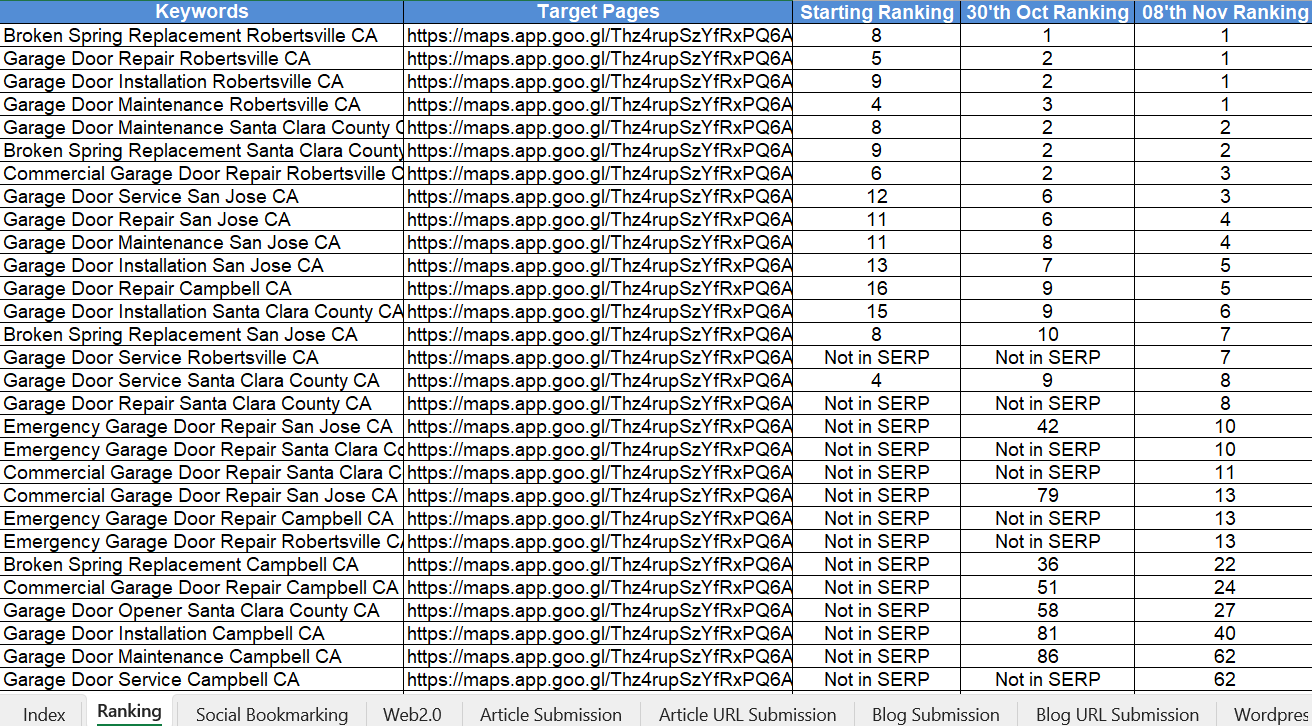5 Marketing Tips for Small Tool Businesses
Running a small tool business comes with its unique set of challenges, especially when it comes to marketing. With limited budgets and resources, it's essential to implement effective marketing strategies that can drive growth and enhance brand visibility. This guide presents five actionable marketing tips tailored for small tool businesses to help you stand out in a competitive market.
Table of Contents
1. Target a Local Audience
As a small tool business, focusing on your local market can yield significant benefits. Local customers are more likely to become repeat buyers and can also refer your business to others.
- Local SEO: Optimize your website for local search terms. Include your city or region in your keywords to appear in local search results.
- Google My Business: Create and maintain a Google My Business profile. This enhances your visibility in local searches and Google Maps.
- Community Engagement: Participate in local events, sponsor local sports teams, or engage with community groups to build brand recognition.
2. Utilize Social Media
Social media platforms are powerful tools for reaching and engaging with your target audience. They offer a cost-effective way to promote your products, interact with customers, and build a loyal community.
- Choose the Right Platforms: Focus on platforms where your target audience is most active. For tool businesses, Facebook, Instagram, and LinkedIn can be particularly effective.
- Consistent Posting: Maintain a consistent posting schedule to keep your audience engaged. Share updates, promotions, and useful content regularly.
- Engage with Followers: Respond to comments, messages, and reviews promptly. Building relationships with your followers can enhance customer loyalty.
3. Leverage Content Marketing
Content marketing helps establish your business as an authority in the tool industry. By providing valuable information, you can attract and retain customers.
- Blogging: Start a blog on your website where you share tips, how-to guides, and industry news related to tools and machinery.
- Video Tutorials: Create video content demonstrating how to use your tools effectively. Videos can increase engagement and provide a better understanding of your products.
- Infographics: Use infographics to present complex information in an easy-to-understand format. This can include product comparisons, maintenance tips, and safety guidelines.
4. Optimize for SEO
Search Engine Optimization (SEO) is crucial for increasing your online visibility. By optimizing your website and content, you can attract more organic traffic and generate leads.
- Keyword Research: Identify relevant keywords that your potential customers are searching for. Incorporate these keywords naturally into your website content, product descriptions, and blog posts.
- On-Page SEO: Optimize your website’s meta titles, meta descriptions, header tags, and image alt texts. Ensure your website has a clear structure and is easy to navigate.
- Backlink Building: Acquire high-quality backlinks from reputable websites. This can improve your domain authority and search engine rankings.
5. Engage with Customers
Customer engagement is key to building long-term relationships and fostering loyalty. Engaging with your customers can lead to repeat business and positive word-of-mouth referrals.
- Customer Feedback: Encourage customers to provide feedback and reviews. Use this information to improve your products and services.
- Personalized Communication: Send personalized emails and messages to customers. Tailor your communication based on their purchase history and preferences.
- Loyalty Programs: Implement loyalty programs that reward repeat customers. Offer discounts, exclusive offers, or early access to new products as incentives.
Conclusion
Implementing effective marketing strategies is essential for the growth and success of small tool businesses. By targeting a local audience, utilizing social media, leveraging content marketing, optimizing for SEO, and engaging with customers, you can enhance your brand visibility, attract more customers, and drive sales growth.
Remember to continuously evaluate your marketing efforts, stay updated with industry trends, and adapt your strategies to meet the evolving needs of your customers. With dedication and strategic planning, your small tool business can thrive in a competitive marketplace.
Frequently Asked Questions (FAQ)
1. What are the most effective marketing channels for small tool businesses?
Effective marketing channels include social media platforms (Facebook, Instagram, LinkedIn), local SEO, content marketing (blogs and videos), email marketing, and participating in local events or trade shows.
2. How can I improve my local SEO for my tool business?
Improve local SEO by optimizing your Google My Business profile, using local keywords in your website content, obtaining local backlinks, and encouraging customers to leave reviews on your Google listing.
3. Why is social media important for small tool businesses?
Social media allows small tool businesses to reach a broader audience, engage with customers, showcase products, and build brand loyalty through regular interaction and targeted advertising.
4. What type of content should I create for my tool business blog?
Create content that provides value to your customers, such as how-to guides, product tutorials, maintenance tips, industry news, and case studies showcasing successful projects using your tools.
5. How can I use email marketing to boost sales?
Use email marketing to send personalized offers, product updates, newsletters, and follow-up emails to nurture leads and encourage repeat purchases from existing customers.
6. What are some cost-effective advertising options for small tool businesses?
Cost-effective advertising options include social media ads, Google Ads with targeted keywords, local sponsorships, email marketing campaigns, and content marketing efforts like blogging and video tutorials.
7. How important are customer reviews for my tool business?
Customer reviews are crucial as they build trust and credibility, influence purchasing decisions, and improve your local SEO rankings. Encourage satisfied customers to leave positive reviews online.
8. How can I create engaging social media content for my tool business?
Create engaging content by sharing high-quality images and videos of your tools in action, customer testimonials, behind-the-scenes looks at your business, and interactive posts like polls or Q&A sessions.
9. What role does branding play in marketing my small tool business?
Branding helps differentiate your business from competitors, establishes trust with customers, and creates a memorable identity. Consistent branding across all marketing channels enhances recognition and loyalty.
10. How can I measure the effectiveness of my marketing strategies?
Measure effectiveness by tracking key performance indicators (KPIs) such as website traffic, social media engagement, conversion rates, sales growth, customer acquisition costs, and ROI from advertising campaigns.
11. Should I invest in paid advertising for my tool business?
Yes, paid advertising can be highly effective in reaching a larger audience, generating leads, and driving sales. Start with a small budget, test different ad formats and channels, and scale up based on performance.
12. How often should I update my website content?
Regularly update your website content to keep it fresh and relevant. Aim to publish new blog posts at least once a week, update product listings as needed, and refresh your homepage and landing pages quarterly.
13. What are some effective ways to engage with customers online?
Engage with customers by responding to comments and messages promptly, hosting live Q&A sessions, creating interactive content, offering personalized recommendations, and soliciting feedback through surveys.
14. How can I use video marketing to promote my tool business?
Use video marketing to create product demonstrations, how-to tutorials, customer testimonials, and behind-the-scenes videos. Share these videos on your website, social media channels, and video platforms like YouTube to increase engagement and visibility.
15. What is the importance of having a mobile-friendly website?
A mobile-friendly website ensures that visitors accessing your site from mobile devices have a positive user experience. It improves your SEO rankings, increases engagement, and boosts conversion rates as more users browse and shop on their smartphones.
16. How can I use local events to market my tool business?
Participate in local trade shows, community events, and workshops to showcase your tools, demonstrate their effectiveness, and connect with potential customers face-to-face. Sponsoring local events can also increase your brand visibility.
17. What are some ways to build customer loyalty?
Build customer loyalty by offering exceptional customer service, implementing loyalty programs, providing exclusive discounts or early access to new products, and regularly engaging with customers through personalized communication.
18. How important is website speed for my tool business?
Website speed is critical as slow-loading websites can lead to higher bounce rates and lower conversion rates. Ensure your website is optimized for fast loading by compressing images, using efficient code, and leveraging browser caching.
19. Can influencer marketing benefit small tool businesses?
Yes, partnering with influencers in the construction, DIY, or manufacturing sectors can help you reach a broader audience, build credibility, and generate authentic engagement for your tool business.
20. How can I effectively use email marketing campaigns?
Segment your email list based on customer behavior and preferences, create personalized and valuable content, use compelling subject lines, and include clear calls-to-action. Regularly analyze campaign performance to optimize your strategies.
21. What role does customer feedback play in marketing?
Customer feedback provides insights into customer satisfaction, preferences, and areas for improvement. Use this feedback to refine your products, enhance customer service, and tailor your marketing messages to better meet customer needs.
22. How can I differentiate my tool business from competitors?
Differentiating your tool business can be achieved through unique product offerings, exceptional customer service, competitive pricing, and building a strong brand identity that resonates with your target audience.
23. Should I offer discounts or promotions to attract customers?
Offering discounts and promotions can attract new customers and incentivize repeat purchases. However, ensure that your pricing strategy maintains profitability and that promotions are strategically timed to maximize impact.
24. How can I use analytics to improve my marketing efforts?
Use analytics tools to track key metrics such as website traffic, conversion rates, customer behavior, and campaign performance. Analyzing this data helps identify successful strategies, areas needing improvement, and opportunities for optimization.
25. What are some cost-effective ways to advertise my small tool business?
Cost-effective advertising methods include leveraging social media platforms, utilizing local SEO, engaging in content marketing, implementing email marketing campaigns, and participating in community events or trade shows.



